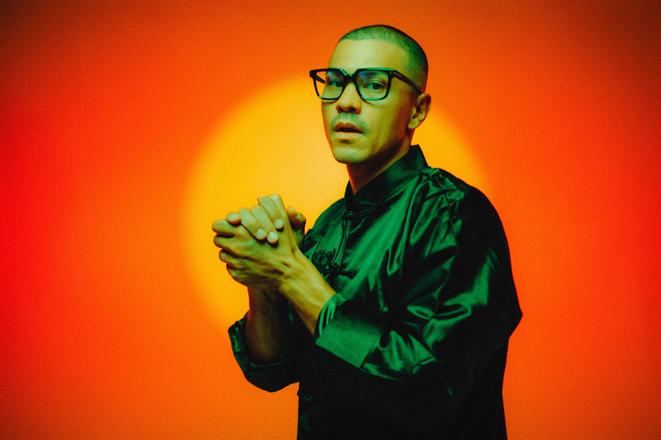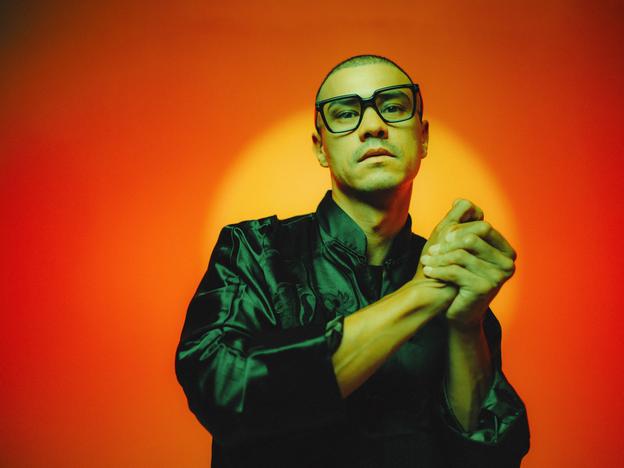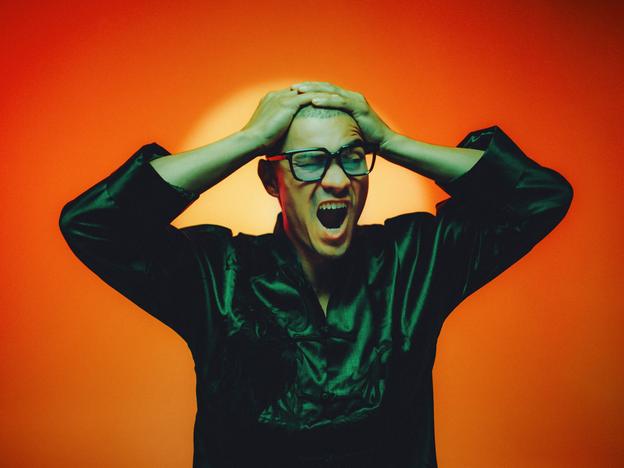Ivana Kohutková is the editor-in-chief of fjúžn magazine, named after the festival about foreigners and minorities in Slovakia, organised by the Milan Šimečka Foundation. The festival has been held in Slovakia for 19 years.
The interview was originally published in the magazine fjúžn.
Michal Novotný, better known to the public as "Yaksha", hails from Martin, northern Slovakia. His father was from Vietnam, though Novotný only got to know his Vietnamese side of the family after his father’s death.
Straight after secondary school, he founded one of Slovakia’s first streetwear shops and was a frequently booked DJ, later becoming the CEO of the prestigious record label Def Jam Recordings. He owns the creative agency LOVE THEM and the globally renowned music label F*CK THEM, which has garnered over a billion views on YouTube. He was instrumental in launching both international and Slovak artists and works as a creative for some of the biggest names and brands in the industry. He is a lover of fashion, art, and active sports.
He is also involved in the community of Slovak Vietnamese, connecting the first, second, and later generations of Vietnamese immigrants.
Your father was Vietnamese and your mother Slovak. What is your family history?
My grandparents were descendants of circus performers and carousel operators. In Humenné, eastern Slovakia, where they were performing at the time, my mother was born. Their relationship didn’t work out, and they separated. My grandmother found another traveller who didn’t have a circus but sharpened scalpels for doctors in hospitals and repaired umbrellas. They travelled to towns where there were hospitals. Nowadays, I can’t imagine someone sharpening scalpels in a caravan.
How did your mother meet your Vietnamese father? It was in the 1980s.
I’m not entirely sure. I was born when she was 19; they probably got together about a year earlier. There were jokes going around that he won her over because he wore jeans and had a digital watch. That was probably all he owned; he came to Czechoslovakia with a plastic bag. In reality, it was likely not much of a romance or anything special. They ran into each other at a disco in Martin or during friendly gatherings at the dormitory where my mother lived for a while. Vietnamese students were coming here for exchange programmes then. My father was studying engineering in Martin.
Why did he choose Czechoslovakia?
My grandmother worked as a professor at a Vietnamese university. As a mother of several children, she was offered the chance for one of them to go on a study visit to another friendly communist country. She sent the eldest because there was a good chance they would return because of the other siblings.
And did he come back?
He liked it here, but later he tried to return to Vietnam. However, he couldn’t handle the climate there. It was too hot for him, and he didn’t feel comfortable, so he came back to Czechoslovakia.
So they stayed to live in Czechoslovakia?
No. They didn’t get along at all; they had a terrible relationship. I think they were people who were meant to meet only so that my sister and I could be born. I don’t mean that in a bad way; I’m very glad to have a sister and that they didn’t ruin their lives for long. At one point, my mother even had my father deported from Czechoslovakia. But then she realised it wouldn’t be right for the children to grow up without a father. She asked Olga Havlová, then Czechoslovak First Lady, to cancel the deportation. We went to Prague with her, and it was all very emotional. We travelled on an overnight train. I remember it vividly because they sold Barbies in the shops in Prague.
Did your father’s deportation get cancelled?
Thanks to the fact that they had two children together, it worked out. But it was much more complicated. In the meantime, my mother found a new partner. A friend of my father’s, also Vietnamese. The wedding eventually took place because my grandmother insisted that my mother marry my father. Everything was prepared and planned, and my father got permission to return, and everything pointed towards him coming back to the family and marrying. The wedding was attended by my father and mother, who didn’t want to get married at all, as well as the other Vietnamese man, with whom my mother eventually broke up. The wedding photo doesn’t look very happy. They then tried to live together for a while, but their relationship had deteriorated so much that they couldn’t stay together.
In the end, your father left you. Did you stay in contact with him?
The court proceedings dragged on for a long time, and my father became estranged from us. Even though he lived in Martin like us, we didn’t hear anything about him for years. Only occasionally something through hearsay.
Did you try to reach out to him as you got older?
I’ve always been interested in my father. From what happened, my mother and grandmother felt a great injustice. I grew up thinking my father was the bad guy, and I was on the good side. During my teenage years, I realised that the truth has two sides, and I tried to search for him. Then one day he wrote me a letter apologising for everything. At that time, he was held in Medveďov, a detention centre for foreigners about an hour’s drive from Bratislava. They wanted to deport him because he had gotten into some trouble. He managed to escape from Medveďov, and I visited him in Bratislava.
What was your father doing in Bratislava?
He lived on Nobel Street, which was, and still is, a sort of centre for Vietnamese people. When I first went to see him, he was waiting for me at the station and took me for a phở,noodle soup, to a secret bistro that still operates. I still go there for a phở, probably for the last 25 years. But what he was doing in Bratislava, I still don’t know. I think it wasn’t anything above board, as he had to run away from there.
Was that around the time he travelled to Sweden?
Yes. Another convoluted story. He lived alone in Sweden and died very tragically after eating poisonous mushrooms. It’s very typical for Vietnamese people to be herbalists; they know what to eat, how to treat themselves, and how to prepare various dishes. My father was used to and convinced that the mushrooms were edible. I didn’t know how to get his remains back to Slovakia because he lived there illegally and even had a different identity. On paper, he simply didn’t exist. Eventually, a friend of mine who was flying from there tried to bring back his urn, and he managed to smuggle it back to Slovakia. Then came another problem. How to bury a person who doesn’t actually exist? I tried to do it legally by contacting the Foreign Ministry. In the end, I had to buy a cemetery plot for myself and bury him there.
Did you ever get a chance to know the Vietnamese side of your family?
Yes, but only after my father’s death. As the eldest son, I fulfilled the unwritten obligation by burying him. I also wanted to inform his family. Through some Vietnamese people living in Martin who had known my father in the past, I eventually managed to get in touch with my father’s sister. We told her. My father had another sister and two brothers. The sister took the news coldly, and we didn’t know if it would even reach the others. I mentioned that we were planning a trip to Vietnam, but she didn’t show much interest in us. My partner, sister, and I decided to go there on holiday. We said if we met them for lunch or coffee, that would be great. We didn’t push anything. In the end, it was a happy ending, like in a soap opera. They completely changed our plans, and we cancelled our trips. We spent most of the time we were in Vietnam with them. They took us to hidden local spots; we ate and kept meeting more family members, and everyone came to see us. At that point, we felt like part of the family.
Were you surprised by anything about your family?
My whole life, I experienced that when someone introduced my aunt to me at a family gathering or holiday, she was blonde, while my uncles were red-haired. In Vietnam, I was surprised that even the neighbours looked like my family; I was just a head and a half taller. It was lovely.
Are you still in contact with them?
We are, but an unpleasant situation arose. When they recognised me and began following me on social media, they realised I was living a successful life. I never felt they wanted to exploit that, but then Covid-19 hit, my uncle’s company got into financial trouble, and he asked me if I could lend him a large sum of money. It was very uncomfortable, but at that time it was a global problem, so I just helped them. Since then, they have cut off contact. I think they can’t give me back what they owe, so they chose this easier route. I visited them once more; I wanted to see my grandmother. She’s ill and has been placed in some facility. I even emphasised that I didn’t want to discuss money with them to avoid making them feel uncomfortable. However, the meeting felt purely polite; it was clear that the relationships were strained. At the moment, we have very little contact. Once or twice a year, they only write back that my grandmother is doing well.
Have you adopted any aspects of Vietnamese culture into your life?
Unfortunately not. I know this might sound bad after everything I’ve said, but it seems to me that in Vietnam, people care about family relationships and spending time together. They have lunch and dinner together every weekend, and it can last up to four hours. When we first arrived there, we were so hungry that we ate all 50 dishes placed before us in 15 minutes. We didn’t even know how to breathe, and then we watched them eat and talk for four hours.
Do you have a favourite Vietnamese dish?
My favourite dish is thịt kho, braised pork belly with eggs. Bún bò nam bộ and phở bò are classics. I also really enjoy their omelette with shrimp, mint, and coriander. It’s torn by hand and dipped in sauce. I like that most authentic Vietnamese food consists of herbs and vegetables. They grow them in their gardens. They also eat meat, but it has to include fat, bone, or cartilage to make it crunchy. I was surprised, however, that they eat very little rice. When I asked why, they replied that they’d rather have a beer than fill their stomachs with rice. It’s served in half-litre glasses with a huge ice cube. What’s funny is that whenever someone wants to drink, everyone has to toast and drink together. On the one hand, it’s a bit annoying, but on the other, everyone ends up being more or less equally drunk.
You meet members of the Vietnamese community, Vietnamese Roots, in Slovakia over Vietnamese food. How does it work?
One of the members owns a street food bistro called Phočkáreň, so we’re well catered for when it comes to authentic Vietnamese cuisine. They approached me two years ago to help organise the Vietnam Day festival. I was thrilled to be involved and to contribute. The founders come from an older generation and understand the importance of involving young people, as they bring fresh ideas. We meet regularly to discuss how everyone can help. For example, when we were trying to have the Vietnamese minority recognised officially in Slovakia, we talked about who had what resources to offer.
You succeeded in achieving this recognition last June after two years of effort. How did that feel?
I was overjoyed and pleased to have played a part in it.
You’ve been working since you were 18, engaging in creative, musical, artistic, and fashion industries, and you have a substantial following on social media. What achievement are you most proud of?
When I once asked my Instagram followers what they found most interesting about my content, many said I motivate them to take better care of themselves and to be active. I’ve managed to inspire a large group of people who, in turn, help motivate others. I’m glad it’s not just about me. For instance, I started running. In the first three months, we had five of us. Now, under the brand LTRC, 500-600 people from 35 clubs around the world run every week. I’m proud to manage my influence responsibly.
You publicly state that you are successful and wealthy. Many people with that status, especially abroad, engage in philanthropy. Do you support any organisation, initiative, or help anyone in need?
When our mother fell ill, we spent a lot of time with her in the hospice. We met many volunteers there who were helping out. My sister took her death very hard, so I suggested she take a break from work to focus on herself. During that time, she started visiting the hospice, then shelters, and finally a children’s home in Kolárovo, an hour’s drive from Bratislava. She wanted to get involved in various charitable projects, so I began helping her with that. Every summer, we take two or three children from the children’s home for a week. We also gather Christmas gifts for them each year. I have a photo somewhere with about 600 gifts in my living room. They’re not old things that no one wants; we ask the children what they wish for, and they send us specific requests with links to websites. Then we gather, buy, wrap, and check that we haven’t forgotten anyone, and deliver the gifts to the children. My friends from the Kruh bakery and I bake panettones, Italian Christmas cakes, for St Nicholas (December 6 - Ed.) and take them to the kids. So, philanthropy isn’t my primary focus; I’m more of a support for my sister. She’s the heart of the projects, and I’m the one who helps organise things. We have a very close relationship, and I try to support her.
© [fjúžn] magazine

 Michal Novotný, better known to the public as "Yaksha", hails from Martin, northern Slovakia. (source: Soňa Maletz Nosáľová)
Michal Novotný, better known to the public as "Yaksha", hails from Martin, northern Slovakia. (source: Soňa Maletz Nosáľová)
 "My whole life, I experienced that when someone introduced my aunt to me at a family gathering or holiday, she was blonde, while my uncles were red-haired. In Vietnam, I was surprised that even the neighbours looked like my family; I was just a head and a half taller." (source: Soňa Maletz Nosáľová)
"My whole life, I experienced that when someone introduced my aunt to me at a family gathering or holiday, she was blonde, while my uncles were red-haired. In Vietnam, I was surprised that even the neighbours looked like my family; I was just a head and a half taller." (source: Soňa Maletz Nosáľová)
 "When I once asked my Instagram followers what they found most interesting about my content, many said I motivate them to take better care of themselves and to be active." (source: Soňa Maletz Nosáľová)
"When I once asked my Instagram followers what they found most interesting about my content, many said I motivate them to take better care of themselves and to be active." (source: Soňa Maletz Nosáľová)